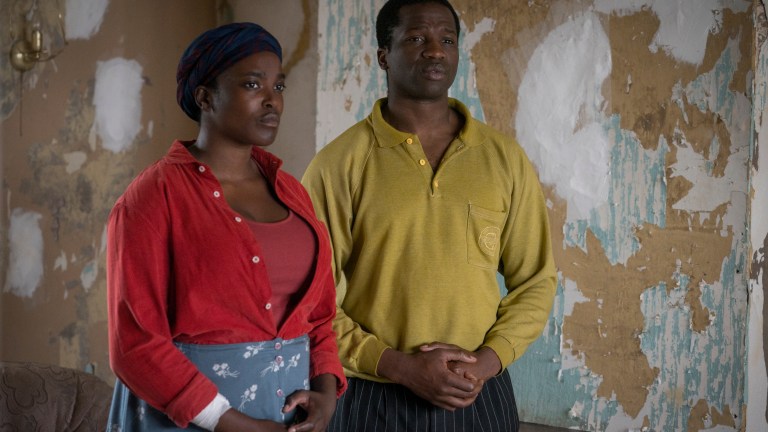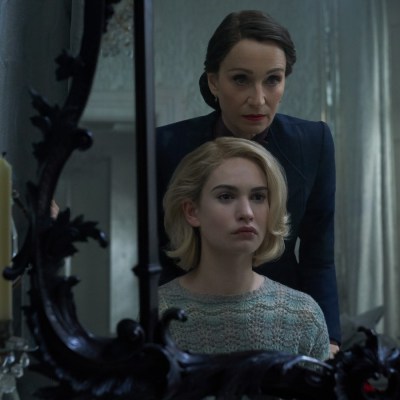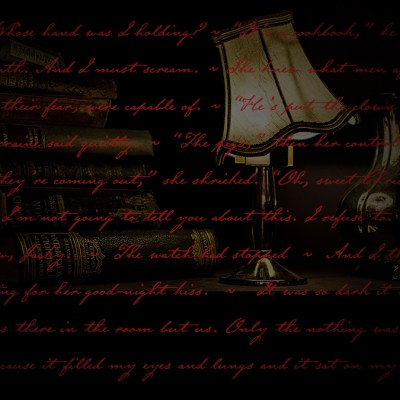His House Ending Explained: The Apeth, the Ghosts and the Meaning of the Title

Remi Weekes debut movie, His House, has taken Netflix by storm. It’s a very current story of two Sudanese refugees who are given asylum in Britain but under some oppressive conditions including that they must not work and they must not leave the house which they are assigned. But the couple has brought something with them on their journey and the two are tormented inside the squalid house by ghosts and apparitions who live in the walls but can inflict very real damage on the pair.
His House is social commentary but also an out and out horror. It also uses elements of Sudanese myth as Rial (Wunmi Mosaku) and Bol (Sope Dirisu) are haunted by an ‘apeth’ or ‘night witch’ who has risen from the ocean and pursued the couple, who wants them to atone for their sins.
As the house deteriorates further and further the film leads us to a first shocking but then redemptive conclusion.
Bol and Rial’s secret
Rial believes the couple has brought an ‘apeth’ with them who wants them to repay a debt, it’s only as the film progresses that we understand the full weight of that debt. At the start of His House we see Bol carrying a young girl, Nyagak (Malaika Wakoli-Abigaba) in Sudan and later on a boat across the ocean. We understand the girl died during the crossing and think that Nyagak is the couple’s daughter who is now haunting them.
Later, during the night time crossing the boat capsizes and while Bol helps Rial to the safety of a rescue vessel, Nyagak and many others drown. Rial has blanked out part of the memory and still believe Nyagak is her child, it is only in a dream in union with the women of her village that she comes to the full realisation of what she has done.
Later we understand their guilt and shame runs much deeper. Under extreme threat in Sudan a truck taking passengers to the boat to escape is already full, without Bol and Rial having a seat. In a moment of panic, Bol grabs a young girl, Nyagak and claims a place in the truck for her as well as Bol and Rial on the pretence that she is their child. But when the truck starts moving and Nyagak sees her mother out of the window, the two start screaming for each other. As her mother runs after the truck she is gunned down.
The Ghosts
The ghosts that inhabit the walls and haunt the rooms of the house are of different sorts. Nyagak, wearing a grotesque face mask, is one of the more tangible of the ghouls, often wielding a knife and able to switch lights on and off.
But the house is full of other ghosts too – the ghosts of others who had drowned while trying to escape across the ocean, the ghosts of Nyagak’s dead mother and the ghosts of the women who were massacred in the village in Sudan, and by the end, any number of other ghosts from the couple’s past. These are not necessarily malevolent.
Then finally there is the apeth.
The Apeth
An ‘apeth’ or Night Witch is a figure from Dinka culture. Rial explains that her mother used to tell her a story of a good man who wanted his own house so desperately that he began to steal from other people. But he stole from an old man who turned out to be an apeth. When he built his home the apeth lived there too and would whisper spells and would never stop until the man repaid his debt. Because of Nyagek an apeth has risen from the ocean and followed the couple to England, she explains. It speaks to Rial and tells her that they do not belong here and they must leave and repay their debt.
Bol won’t accept this at first.
Initially he tries to burn Nyagak’s doll and other stuff from Sudan and to lean hard into British culture – into ‘fitting in’, believing that erasing their past is the only way to move forward. When he is still tormented by Nyagak’s ghost he hacks apart the walls and screams that ‘this is my house!’.
Still not at peace, Bol tries to throw himself at the mercy of the councilman Mark (Matt Smith) begging him to house them somewhere else and claiming there are rats – when Mark visits, Rial insists on telling him about the witch.
When Mark threatens to report the damage to the house Bol promises to fix it. He now barricades himself and Rial inside and removes all the door handles and locks all the windows in an attempt to force them both to stay in, and then he contacts the apeth himself.
The apeth tells Bol, “No matter where you go I will follow. You are mine now.” and says that he must exchange his life for Nyagak. While he is in a trance-like state Rial manages to escape the house but finds herself in a traumatic memory from Sudan where she hid in a cupboard while a massacre of women took place. The apeth implores her to give his her husband’s flesh.
Ultimately Rial returns. Bol decides to face the apeth and cuts into his flesh, and the apeth comes. The apeth, played by legendary creature performer Javier Botet who has appeared in numerous horror films including the [REC] franchise, It Chapters one and two and The Conjuring 2, is a very real physical presence that tries to get under Bol’s skin (literally) but Rial, realising what she must do, slits the apeth’s throat, killing it and saving Bol.
The Final Inspection
Bol has had to accept and embrace his heritage rather than trying too hard to to be ‘one of the good ones’ – director Remi Weekes explains this: “One of the books I really enjoyed was The Good Immigrant, and that says a lot about the need for immigrants to be good or to be accepted by society or the government. And so I guess that’s an acknowledgement of the need for immigrants or people who could be demonized, to be performative, in order to be accepted.”
While Rial, who has struggled to feel any sense of belonging – she gets lost, some black kids she asks for help mock her accent and tell her to go back to Africa – attempts to embrace their new way of life a bit more and let go of the ghosts of Nyagak and the massacred women, while acknowledging they will always still be there.
“It’s there still a witch?” Mark ask the pair when he and some colleagues come to inspect the house, which is now beginning to see signs of repair.
“Rial killed it,” replies Bol, in a moment of humour but also in an act of acknowledging his own heritage rather than hiding it.
“Your ghosts follow you, they live with you, it’s when I let them in I could start to face myself,” says Bol.
“This is our home. We are happy here,” says Rial.
We see that the house is filled with ghosts, but they are no longer hidden in darkness but standing with the couple, all together in a group.
His House
So what does the title mean? There are a few possibilities. A line that we hear variations on a couple of times in the film is “his house is bigger than mine” – it’s a line which encompasses many of the themes well in that the Brit council workers see asylum seekers being given a large property and want them to be grateful without understanding the effects the tiny amount of money they have to live on, the endless list of rules they must abide by, not being allowed to move and not being allowed to work and the difficulty of fitting into a whole new community where you are completely ‘othered’ have.
That it’s ‘his’ house (as opposed to ‘my house’ for example) immediately casts Bol as ‘other’ – that he’s not even the protagonist in his own story.
That it is ‘his’, as opposed to ‘her house’ or ‘their house’ is also worth noting. Weekes says there’s an element of critiquing “how you have to be to be a man” in the film and it’s clear that Bol is trying to lead and be in control – while ultimately it is Rial who saves him. There are moments of masculinity where he behaves with aggression – taking a hammer to the walls, burning their stuff, locking Rial in the house and stopping her from leaving, which ends in her stabbing him with a screwdriver – which are at best futile and at worst incredibly damaging.
Finally – and this might be grasping at straws but, we’ll throw it out there – to some viewers the phrase ‘His House’ has links with the Christian Church. A church would be known as ‘His House’ as in God’s, and in addition there’s a line from John 14:2 where Jesus says: “My Father’s house has many rooms; if that were not so, would I have told you that I am going there to prepare a place for you?” – this as in Heaven.
His House the movie doesn’t especially seem to have anything to do with Christianity and it’s not the religion or culture of Bol and Rial but the house that they move into does indeed have many rooms which now house the ghosts of the dead. A bit of a stretch, but still.
His House is available to stream on Netflix now.


